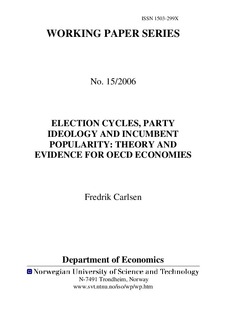Election cycles, party ideology and incumbent popularity: Theory and evidence for OECD economies.
Research report
Permanent lenke
http://hdl.handle.net/11250/267034Utgivelsesdato
2006Metadata
Vis full innførselSamlinger
Sammendrag
The paper presents a rational political business cycle model where voters are imperfectly informed about both incumbent competence and incumbent preferences. The model predicts that election cycles on real variables are observed mainly when the incumbent is right-wing and unpopular. The model is put to test on a data set comprising 56 elections in eight OECD countries. Opinion poll series have been collected for each election campaign to compute estimates of the government's reelection chances. The results are broadly consistent with the theoretical model: there is evidence of abnormal pre-election decreases in unemployment and increases in output when right parties hold office and re-election prospects are poor but otherwise not.
